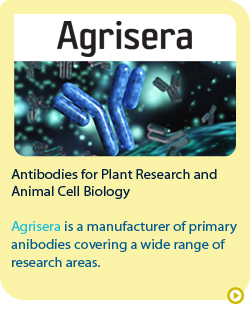News: TurboID Antibody from Agrisera for Proximity Labelling Studies
|
The BioID Proximity Labelling technique is a recent method that allows the study of protein-protein interactions (PPI) in live cells, unicellular organisms, plant and animal models. The key advantage of BioID over other PPI methods is that it can detect weak and transient protein interactions with the target protein over a period of time. In particular, proximity labelling studies with TurboID are widely used to map protein-protein interaction networks, identify proteins localised to specific subcellular compartments, and gain insights into the spatial organisation of proteins within cells.
How does proximity labelling work? Cells are made to express the protein of interest fused to a mutant E. coli biotin ligase, which upon addition of biotin, covalently labels the proteins that interact or come close to the target protein.
The resulting biotinylated proteins can then be pulled out with streptavidin beads and studied by Western Blotting or by mass spectroscopy when performing proteomics studies. These studies are essential to biological research and provide valuable clues that help elucidate the roles played by the tagged proteins in various cellular processes.
What is TurboID? TurboID, is a biotin ligase variant with greater catalytic activity than the originally developed BioID/BirA*, only requiring an incubation time of 10 minutes at room temperature. In addition to its rapid labelling properties, TurboID benefits from being applicable to a wide range of host systems, including mammalian cells, plant models, yeast and other model organisms.
Agrisera has recently developed a TurboID polyclonal antibody (AS20 4440) suitable for Western Blotting. This antibody has been independently validated by WB in Arabidopsis thaliana leaves.
If you have any questions regarding this product, or require any other epitope tag antibodies, please contact us at: tech@nktscientific.com
Other epitope tag antibodies you may be interested in:
References:
Shi et al. (2023). Protocol to identify protein-protein interaction networks in Solanum tuberosum using transient TurboID-based proximity labeling . STAR Protocols, Volume 4, Issue 4, 2023, 102577. doi: 10.1016/j.xpro.2023.102577.
Zhang et al. (2020). TurboID-Based Proximity Labeling for In Planta Identification of Protein-Protein Interaction Networks.J Vis Exp. 2020 May 17;(159). doi: 10.3791/60728.
Cho et al. (2020). Proximity labeling in mammalian cells with TurboID and split-TurboID.Nat Protoc. 2020 Dec;15(12):3971-3999. doi: 10.1038/s41596-020-0399-0.
Mair et al. (2019). Proximity labelling of protein complexes and cell-type-specific organellar proteomes in Arabidopsis enabled by TurboID. Elife . 2019 Sep 19;8:e47864. doi: 10.7554/eLife.47864. |



